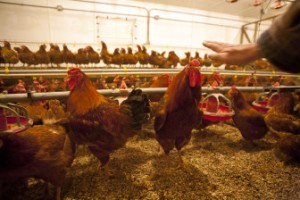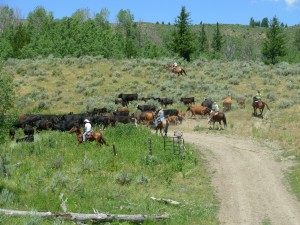With Thanksgiving drawing near, we’re creating menus and wasting spending hours each day surfing Pinterest for ideas. What we put on the table–the time and energy that represents our love–is important. But did you know that you could possibly save lives by using sustainable sourcing for your holiday meals?
Local, organic farms and artisans need our help. Numerous regulations are in place that put small farms, co-ops, CSAs and independent food businesses at a grave disadvantage. The crazy thing is that many of these regulations don’t seem to serve a greater purpose; they do not improve the quality of the product, the wellbeing of the consumer, or the sustainability of the food industry. In spite of this insanity, we can help our local entrprenuers by spending wisely during the holidays.
The Story of Your Holiday Turkey 
Turkey is a holiday staple for many families. You’ll probably pick up a name-brand, affordably priced turkey and not even look twice at the locally-raised option that may be a few dollars more. Turkey is turkey. It can’t be worth the higher price, right?
It’s absolutely worth the higher price. Buying the local turkey means higher quality meat for your family, a bird that enjoyed humane living conditions, a more diverse and therefore stronger economy, and members of your community who can provide for their families by doing something that they love. A couple of bucks influences all of that!
You see, the local turkey costs more because a farmer who owns turkeys cannot legally sell the cured turkey that she makes. She can’t take her own turkey, slaughter it, cure it, and sell some of the meat to her neighbor. If she could, the local turkey would cost less than conventional store-bought turkey.
Instead, the farmer must load up her stock in a truck, haul birds to a distant FDA-certified processing center (there aren’t many centers so the drive is generally long) pay to have someone else slaughter the turkey in a center that isn’t guaranteed to be any more sanitary than her own farm, have it cured at an FDA-approved center and then bring it back to her farm. Only then can she can sell it to the guy next door or distribute it to grocers. All of the costs for shipping and processing have increased the price.
Now, your name-brand bird grew up in a warehouse among thousands of other turkeys without daylight or sanitary living conditions. It suffered stresses and abuses long before it was killed, resulting in all sorts of health issues and a lower quality product. But these conditions keep them super cheap.
Having animal products raised in government approved facilities and processed in FDA-approved plants does not insure food safety or quality for many reasons:
- It relies on FDA inspectors doing their jobs consistently and frequently, which doesn’t happen. It’s an inglorious government job so no surprise there.
- Footage from FDA-approved slaughterhouses and packaging plants will show you that the standards don’t seem to mean much. Federally approved facilities can be absolute dumps.
- Productivity is often valued over quality. Such mega-plants process animals so quickly that the quality (and several rules) are overlooked in favor of productivity.
Smaller farms can be much more sanitary and the animals are raised in more humane conditions–you know, actually seeing daylight and roaming outside. But these idyllic farms can get shut down or squeezed out of existence if they can’t pay for costly government licenses or afford the hundred-plus mile trips to slaughterhouses, even if they know how to safely and professionally slaughter their own animals.
As for pricing, small farms have to go through the same regulations as big corporations though their income is negligible in comparison. They don’t have these vast quantities of product to sell to distribute the fees to consumers in smaller quantities.
A similar cycle repeats for local ranchers and farmers across industries. In the end, locally grown, organic and ethically superior produce often costs more but it’s not that the farmers are trying to gouge consumers. They’ve just got a lot of hoops to jump through while trying to make a living by providing their neighbors with nutrient rich, sustainable food.
Why Should You Care?
Competitive Market = Improved Quality Without local farmers, ranchers, and artisans, we no longer have a competitive market when it comes to food. All we have is big agriculture, which has made it known that cheap food is more important to than healthy food or sustainable food sources.
Local Production Empowers Consumers Local is important because it allows consumers to make more conscious and informed decisions. Ever doubt the product’s claims? Visit the farm or ranch yourself. I’ve done it. You’ll notice if the so-called pasture-raised chickens are really roaming free. When food is farmed states away from you in these weird, top-secret style facilities you have no real way of knowing if you’re getting what’s been marketed, or if terms are being interpreted lightly.
Sustainable Foods = Physical and Environmental Health Google search images of animal processing plants and slaughter houses. Look at the conditions that the animals live in. Sure, I think that quality of life matters to the animal but there are also health benefits that will matter to you.
Pastured animals (those permitted to roam freely and live off of the land) produce higher quality meat than animals raised in factories and fed spent grain or worse, forced to cannibalize their own kind. Grasses maximize fat-soluble activators like vitamins A,D, and K, and other goodies like riboflavin, linolaic acid, and polyunsaturated fat. Sustainable turkeys mean healthier Thanksgivings for those who eat them.
Secondly, these large-scale processing plants are unsustainable from top to bottom, resulting in massive fossil fuel consumption, high concentrations of methane and carbon dioxide, water waste, and mono-cropping that depletes the soil.
Federal Food Agencies Don’t Make Sense The FDA and similar government entities aren’t logical.
- The FDA approves medicines with side effects like stroke, heart attack, and sudden death but won’t “approve” the soothing benefits of chamomile tea because it could be misleading.
- The FDA regularly shuts down small farms for fee and license violations but large industries release contaminated products–salmonella, e.coli, mad cow–and their doors stay open.
- A woman can legally smoke and drink through her pregnancies, feed her kids fast food three times a day, never require them to exercise, and she is still legally a good mother but if she feeds her kids raw milk in Massachusetts, she’s a criminal.
Think about that. All food-related government regulations aren’t here for our health and wellbeing. We’ve got to make good decisions for ourselves.
What Can We Do?
We must realize that when we neglect to support local farms, we’re giving up our right to make healthy choices for ourselves. The goverment is willing to turn a blind eye to many unhealthy practices–like drenching plants in chemicals that destroy the ecosystem, drive bees and butterflies towards extinctions and contaminate ground water–because many lawmakers have vested interests in the companies that uphold such practices.
What lawmakers and businesses can’t ignore is money. That’s how we can fight back and save the lives of our neighborhood farmers.
This holiday season, set aside a few minutes to research local co-ops, farms, and ranches in your area. They’re easier to find than you think! Make the choice to support these businesses for your Thanksgiving, Christmas, Hanukah, and other holiday season meals.
Results?
- You’ll find that some items are more expensive than conventionally grown produce while others are more affordable.
- You will also taste the difference!
- The more that you learn, you’ll see that the environmental and economic benefits are priceless.
By shopping local, you’re saving lives: better lives for livestock, nutrient rich soil for sustained harvest, and stronger local economies for you and your neighbors. You’re a freakin’ super hero! It’ll be hard to go back to thoughtless consumerism.
Live in Atlanta? Find sustainable food sources in Atlanta and it’s surrounding suburbs through these helpful directories.